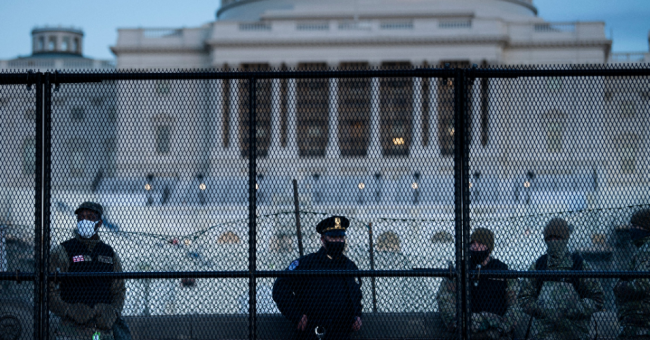Articles Menu

January 11, 2021
Hearing ominous echoes of the post-9/11 crackdown on civil liberties, progressives are warning of the serious dangers posed by the renewed push for fresh laws targeting "domestic terrorism" in the wake of the deadly assault on the U.S. Capitol last week by a mob of President Donald Trump's fanatical supporters.
While acknowledging the threat posed by right-wing extremists across the nation and affirming the need for forceful action in response to last week's attack, observers noted that existing federal laws are more than sufficient to hold the insurrectionists to account for invading the halls of Congress with possible intent to hold lawmakers hostage, attempting to topple the U.S. government, and potentially committing murder.
"There are already plenty of tools at the government's disposal to crack down on far-right insurrection," The Week's Ryan Cooper wrote in a column on Sunday.
"Whatever powers Biden creates today can be used by the enemies of democracy tomorrow. Our civil liberties are simply too fragile, and the risk is much too great."
—Sarah Jones, New York magazine
The problem, Cooper argued, is not a lack of laws but rather a deficiency of will from "police departments and security agencies [that] are composed largely of conservative Republicans, and not a few open fascists." Putting new laws in place would only hand law enforcement agencies additional weapons to wield against the left, Cooper wrote.
"If you just charge the existing agencies with breaking up domestic insurgent networks, at best they will shirk, delay, and drag their feet, and at worst they will completely ignore the fascists while turning any new tools against Black Lives Matter and other left-wing protesters," said Cooper. "Indeed, this is already happening—so far, the charges against the fascist mob have been trespassing or other minor crimes, rather than the felony riot charges the leftist J20 defendants faced for simply being near minor property destruction in downtown D.C. on the day of Trump's inauguration."
As the Wall Street Journal reported last Thursday, President-elect Joe Biden "has said he plans to make a priority of passing a law against domestic terrorism, and he has been urged to create a White House post overseeing the fight against ideologically inspired violent extremists and increasing funding to combat them."
Biden made a point of identifying members of the Trump mob as "domestic terrorists" in remarks following last week's attack, which he condemned as an "all-out assault on our institutions of democracy" led by the incumbent president.
Not long after the mob stormed Capitol Hill, some commentators began calling on Congress to begin work on a specific statute targeting "domestic terrorism"; as ProPublica explained last week, "while federal statutes provide a definition of domestic terrorism, there is not a specific law outlawing it."
The call drew swift pushback from Rep. Alexandria Ocasio-Cortez (D-N.Y.), who tweeted Saturday that "as the vice chair of the Oversight subcommittee who ran investigations into domestic terror laws, I respectfully disagree."
"Our problems on Wednesday weren't that there weren't enough laws, resources, or intelligence," said the New York Democrat. "We had them, and they were not used. It's time to find out why."
Diala Shamas, a staff attorney with the Center for Constitutional Rights, echoed that point, telling The Intercept Sunday that "anyone familiar with the scope of surveillance and targeting of Black political dissents, or Muslim communities, knows that law enforcement has all the tools it needs to aggressively disrupt and hold accountable those who planned and participated in the storming of the Capitol."
"Why they didn't raises serious questions, but it was not because their hands were tied," said Shamas. "We don't need new terrorism designations."
The notorious 2001 Patriot Act, passed in the wake of the 9/11 attacks with Biden's support, provides an expansive definition of "domestic terrorism" that—as the ACLU warned—was "broad enough to encompass the activities of several prominent activist campaigns and organizations," including "Greenpeace, Operation Rescue, Vieques Island, and [World Trade Organization] protesters and the Environmental Liberation Front."
The fears of civil liberties advocates were realized when, as predicted, law enforcement agencies proceeded to surveil and pursue animal rights advocates and environmentalists as well as Muslim Americans.
Warning Biden against enacting additional draconian measures in response to last week's mob attack, New York magazine's Sarah Jones wrote that the "state does not lack teeth" but "has too many at its disposal already." What's really missing in the way law enforcement and prosecutors handle protest—or violent uprisings—is lack of "discretion, and all sense of proportion" when they respond, Jones argued.
"Whatever powers Biden creates today can be used by the enemies of democracy tomorrow," warned Jones. "Our civil liberties are simply too fragile, and the risk is much too great."
[Top photo: A Capitol Police officer stands with members of the National Guard behind a crowd-control fence surrounding Capitol Hill a day after a pro-Trump mob broke into the U.S. Capitol on January 7, 2021, in Washington, D.C. (Photo: Brendan Smialowski/AFP via Getty Images)]